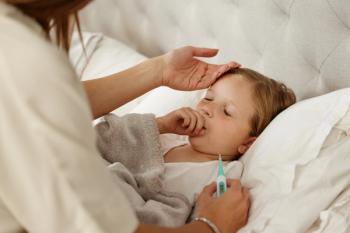
Dupilumab Reduces Severe Asthma Attacks, Improves Lung Function in Children
Results of a phase 3 trial showed clinical benefits with dupilumab (Dupixent; Sanofi and Regeneron) in children with uncontrolled moderate-to-severe asthma.
Treatment with dupilumab (Dupixent; Sanofi and Regeneron) significantly reduced severe asthma attacks and improved lung function in children with uncontrolled moderate-to-severe asthma, according to results from a phase 3 clinical study.
Dupilumab, a fully-human monocloncal antibody that inhibits the signaling of the interleukin-4 and interleukin-13 proteins, is currently approved in the US for indications in atopic dermatitis, asthma, and chronic rhinosinusitis with nasal polyposis.
The LIBERTY ASTHMA VOYAGE trial evaluated the efficacy and safety of dupilumab when added to standard-of-care maintenance therapy of medium-dose inhaled corticosteroids (ICS) with a second controller medication or high-dose ICS with or without a second controller medication. The study included 408 children aged 6 to 11 years of age with uncontrolled moderate-to-severe asthma. Patients in the study received either 100 mg or 200 mg of dupilumab every 2 weeks, based on weight, over the 52-week treatment period.
The primary end point assessed the annualized rate of severe asthma attacks across 2 patient groups. These 2 pre-specified populations included patients with baseline blood eosinophils (EOS) ≥300 cells/μl and patients with markers of type 2 inflammation (fractional exhaled nitric oxide [FeNO] ≥20 ppb or EOS ≥150 cells/μl).
In both patient groups, the results of the showed that those who added dupilumab to standard of care experienced:
- Reduced rate of severe asthma attacks, with a 65% (p<0.0001) and 59% (p<0.0001) average reduction over 1 year compared with placebo (0.24 and 0.31 events per year for dupilumab versus 0.67 and 0.75 placebo, respectively).
- Improved lung function at 12 weeks compared with baseline by 10.15 and 10.53 percentage points for dupilumab versus 4.83 and 5.32 percentage points for placebo, respectively. This clinically meaningful improvement in lung function was observed as early as 2 weeks and was sustained for up to 52 weeks.
Overall, the safety results from the trial were generally consistent with the known safety profile of dupilumab in patients aged 21 years and older with moderate-to-severe asthma. Over 1 year, overall rates of adverse events (AEs) were 83% for dupilumab and 80% for placebo. Most commonly reported AEs included injection site reactions, viral upper respiratory tract infections, and eosinophilia.
“Children with uncontrolled moderate-to-severe asthma often struggle to breathe, largely because of their impaired lung function, and this can have a serious impact on their quality of life,” John Reed, MD, PhD, Global Head of Research and Development at Sanofi, said in a statement. “It not only reduces their ability to participate in day-to-day activities, but can also take a huge emotional toll on the child and their family. Dupixent is the only biologic shown in a controlled phase 3 trial to improve lung function in children, which is generally consistent with results seen in the adolescent and adult trials. These positive data are especially encouraging for younger children who are struggling to manage their uncontrolled asthma.”
Reference:
- Dupixent (dupilumab) significantly reduced severe asthma attacks in children and is the only biologic to demonstrate improvement in children’s lung function in a randomized phase 3 trial. News release. Sanofi; October 13, 2020. Accessed October 16, 2020.
https://www.sanofi.com/en/media-room/press-releases/2020/2020-10-13-07-00-00
Newsletter
Pharmacy practice is always changing. Stay ahead of the curve with the Drug Topics newsletter and get the latest drug information, industry trends, and patient care tips.























